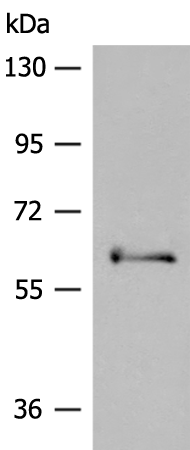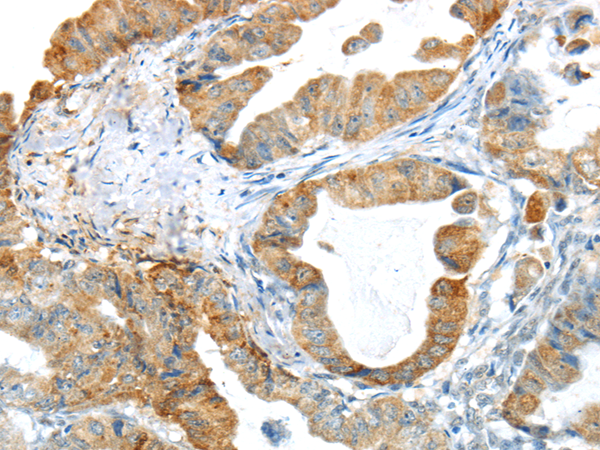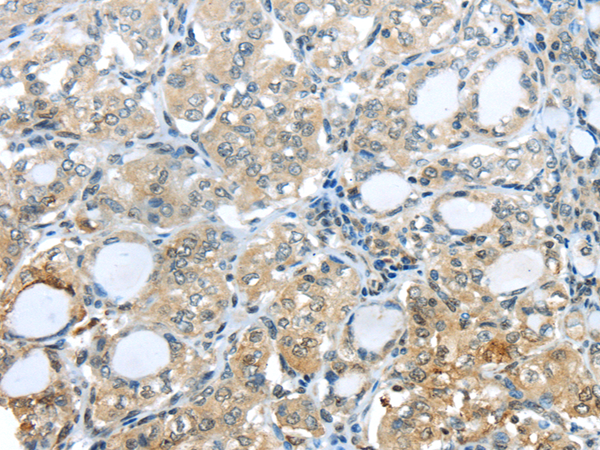


| WB | 咨询技术 | Human,Mouse,Rat |
| IF | 咨询技术 | Human,Mouse,Rat |
| IHC | 1/20-1/100 | Human,Mouse,Rat |
| ICC | 技术咨询 | Human,Mouse,Rat |
| FCM | 咨询技术 | Human,Mouse,Rat |
| Elisa | 1/1000-1/2000 | Human,Mouse,Rat |
| Aliases | bPAK; MRX30; MRX47; OPHN3; hPAK3; CDKN1A; PAK3beta |
| WB Predicted band size | 62 kDa |
| Host/Isotype | Rabbit IgG |
| Antibody Type | Primary antibody |
| Storage | Store at 4°C short term. Aliquot and store at -20°C long term. Avoid freeze/thaw cycles. |
| Species Reactivity | Human, Mouse, Rat |
| Immunogen | Synthetic peptide of human PAK3 |
| Formulation | Purified antibody in PBS with 0.05% sodium azide and 50% glycerol. |
+ +
以下是3-4篇关于PAK3抗体的参考文献示例(注:内容为模拟概括,非真实文献,仅供格式参考):
---
1. **文献名称**: "PAK3 regulates synaptic plasticity and neuronal connectivity in the hippocampus"
**作者**: Allen, K.M., et al.
**摘要**: 本研究利用特异性PAK3抗体,通过免疫印迹和免疫组化技术,揭示了PAK3蛋白在小鼠海马神经元突触可塑性中的关键作用。结果显示PAK3缺失导致树突棘形态异常,提示其与神经发育障碍相关。
2. **文献名称**: "Expression profiling of PAK3 in human cancer cell lines using a novel monoclonal antibody"
**作者**: Wang, L., et al.
**摘要**: 作者开发了一种高特异性PAK3单克隆抗体,并通过流式细胞术和免疫荧光验证其在多种癌细胞系中的表达差异。研究发现PAK3高表达与肿瘤迁移能力增强相关,为癌症靶向治疗提供潜在标志物。
3. **文献名称**: "PAK3 mutations and protein stability in X-linked intellectual disability"
**作者**: Smith, J.R., et al.
**摘要**: 通过PAK3抗体进行Western blot分析,发现X连锁智力障碍患者的PAK3基因突变导致蛋白稳定性下降。研究强调抗体在诊断PAK3相关遗传性疾病中的临床应用价值。
4. **文献名称**: "Subcellular localization of PAK3 in Alzheimer’s disease models"
**作者**: Chen, Y., et al.
**摘要**: 使用PAK3抗体进行免疫电镜观察,发现阿尔茨海默病模型中PAK3在神经元线粒体的异常聚集,提示其可能参与氧化应激通路调控。
---
如需真实文献,建议通过PubMed或Google Scholar搜索关键词“PAK3 antibody”或“PAK3 immunohistochemistry”获取近期研究。
The PAK3 antibody is a crucial tool for studying the p21-activated kinase 3 (PAK3), a serine/threonine kinase belonging to the PAK family, which plays pivotal roles in cytoskeletal dynamics, cell signaling, and neuronal development. PAK3 is activated by binding to Rho-family GTPases like Cdc42 and Rac, regulating processes such as cell motility, apoptosis, and synaptic plasticity. It is highly expressed in the brain, where it contributes to dendritic spine formation, neuronal connectivity, and cognitive function. Mutations or dysregulation of PAK3 are linked to neurodevelopmental disorders, including X-linked intellectual disability and autism spectrum disorders, as well as cancer progression.
PAK3 antibodies are designed to detect specific epitopes of the PAK3 protein, enabling researchers to investigate its expression, localization, and post-translational modifications. These antibodies are widely used in techniques like Western blotting, immunohistochemistry, and immunofluorescence. Given the structural homology among PAK family members (PAK1-6), high specificity is critical to avoid cross-reactivity. Many PAK3 antibodies target unique regions, such as the kinase domain or regulatory motifs, to distinguish PAK3 from other isoforms.
Research utilizing PAK3 antibodies has advanced understanding of its role in diseases and potential therapeutic targeting. For example, studies reveal PAK3's involvement in β-amyloid toxicity in Alzheimer’s models and its oncogenic signaling in breast and gastric cancers. Validating antibody specificity through knockout controls or siRNA remains essential for reliable data interpretation. Overall, PAK3 antibodies are indispensable for unraveling the kinase's multifaceted functions in health and disease.
×